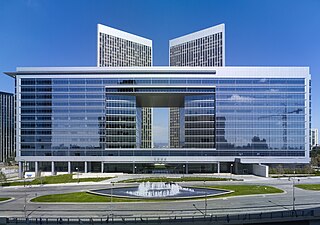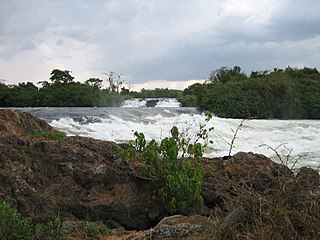Related Research Articles

Investment banking is an advisory-based financial service for institutional investors, corporations, governments, and similar clients. Traditionally associated with corporate finance, such a bank might assist in raising financial capital by underwriting or acting as the client's agent in the issuance of debt or equity securities. An investment bank may also assist companies involved in mergers and acquisitions (M&A) and provide ancillary services such as market making, trading of derivatives and equity securities, FICC services or research. Most investment banks maintain prime brokerage and asset management departments in conjunction with their investment research businesses. As an industry, it is broken up into the Bulge Bracket, Middle Market, and boutique market.
A green economy is an economy that aims at reducing environmental risks and ecological scarcities, and that aims for sustainable development without degrading the environment. It is closely related with ecological economics, but has a more politically applied focus. The 2011 UNEP Green Economy Report argues "that to be green, an economy must not only be efficient, but also fair. Fairness implies recognizing global and country level equity dimensions, particularly in assuring a Just Transition to an economy that is low-carbon, resource efficient, and socially inclusive."

Jeremy D. Allaire is an American technologist and Internet entrepreneur. He is CEO and founder of the digital currency company Circle and chairman of the board of Brightcove. With his brother JJ Allaire, he is a co-founder of the Allaire Corporation in 1995, which had an IPO in January 1999 and was acquired by Macromedia in 2001. Allaire was chief technology officer (CTO) of Macromedia after the acquisition and helped develop the Macromedia MX platform.

Suntech Power Holdings Co., Ltd. is a Chinese producer of solar panels, with 2,000 MW (2,700,000 hp) of annual production capacity by the end of 2011. It is headquartered in Wuxi, Jiangsu. Shunfeng International Clean Energy Limited, a HKSE listed renewable energy investment and Independent Power Producer company, acquired Suntech in 2014 following Suntech's bankruptcy in 2013. With offices or production facilities in every major market, Suntech has delivered more than 13,000,000 solar panels to thousands of companies in more than 80 countries around the world. As the center for the company's global operations, Suntech headquarters, in Wuxi, China, features the world's largest building integrated solar facade.

Ares Management Corporation is a global alternative investment manager operating in the credit, private equity and real estate markets. The company was founded in 1997 with additional offices across North America, Europe, and Asia.
Ezekiel Massat is a Bougainvillean lawyer and politician. Massat was appointed the Vice President of the Autonomous Region of Bougainville by President James Tanis on January 19, 2009. Bougainville is an autonomous region within Papua New Guinea.
Corporate venture capital (CVC) is the investment of corporate funds directly in external startup companies. CVC is defined by the Business Dictionary as the "practice where a large firm takes an equity stake in a small but innovative or specialist firm, to which it may also provide management and marketing expertise; the objective is to gain a specific competitive advantage." Examples of CVCs include GV and Intel Capital.

The Bujagali Power Station is a hydroelectric power station across the Victoria Nile that harnesses the energy of its namesake, the Bujagali Falls, in Uganda. Construction began in 2007 and concluded in 2012. It was officially inaugurated on 8 October 2012 by Ugandan President Yoweri Museveni and Aga Khan IV in the presence of African politicians and investors.
Impact investing refers to investments "made into companies, organizations, and funds with the intention to generate a measurable, beneficial social or environmental impact alongside a financial return". At its core, impact investing is about an alignment of an investor's beliefs and values with the allocation of capital to address social and/or environmental issues.

Riverstone Holdings is a multinational private equity firm based in New York City focused on leveraged buyout, growth capital, and credit investments in the energy industry and electrical power industry sectors. The firm focuses on oil and gas exploration, midstream pipelines, electricity generation, energy and power services, energy and power technology, and renewable energy infrastructure and technology. Riverstone has raised approximately $41 billion since the firm's inception in 2000.
GCL-Poly, founded in 1996, is a subsidiary of Golden Concord Group Limited (GCL), a green energy supplier in China, providing power and heat via cogeneration, incineration and wind power. As of 2009 it was the largest supplier of polysilicon in China, and is also a supplier of electronic wafers for the solar industry.
The China Three Gorges Corporation is a Chinese state-owned power company, established on 27 September 1993. The company was responsible for the construction of the Three Gorges Dam-project, the world's largest hydroelectric power plant, that went into operation in 2008. In September 2002, CTG established the subsidiary company China Yangtze Power, which took over operations and management of Gezhouba and Three Gorges dams. CTG is one of the world's largest energy companies with total assets of RMB 475.5 billion in 2014. Other than hydroelectric dams, the company also operates onshore and offshore wind farms.

Intel Capital Corporation is a division of Intel Corporation, set up to manage corporate venture capital, global investment, mergers and acquisitions. Intel Capital makes equity investments in a range of technology startups and companies offering hardware, software, and services targeting artificial intelligence, autonomous technology, data center and cloud, 5G, next-generation compute, semiconductor manufacturing and other technologies. The firm is one of the most active American investors in the Chinese artificial intelligence industry.

China Fortunes is a 2011 novel by John D. Kuhns. The book is loosely based on his career and experiences in the United States and China. The protagonist followed throughout the book, Jack Davis, is an American financier who begins traveling to China in the 1980s. As Jack conducts business and chases wealth, he encounters the opportunities, as well as the obstacles, available to the few foreigners willing to brave the uncertainties of the PRC at the time. Tracing the beginnings of China’s industrial age and nascent capitalism, the book also takes the reader through Wall Street’s trading floors, IPOs, and multi-national hydroelectric deals.
Bujagali Energy Limited (BEL) is an electric energy generating company in Uganda. The company owns and operates the Bujagali Power Station, the largest hydropower plant in the country as of July 2014.
I Squared Capital is a private equity firm focusing on global infrastructure investments. The company invests in energy, utilities, transport and telecom projects in North America, Europe and select high growth economies, such as India and China.

CDH Investments is a major Chinese alternative asset management firm based in Beijing, China. It specializes in private equity, venture capital and credit products. CDH invests across a range of sectors and regions. As of March 2015, CDH manages over RMB 100 billion of investor capital across its various investment platforms.

A non-binding independence referendum was held in Bougainville, an autonomous region of Papua New Guinea, between 23 November and 7 December 2019. The referendum question presented a choice between greater autonomy within Papua New Guinea and full independence; voters voted overwhelmingly (98.31%) for independence.

Ishmael Toroama is a Bougainvillean politician who was elected President of the Autonomous Region of Bougainville in 2020. He is a former commander in the Bougainville Revolutionary Army.
Theonila Roka Matbob is a Bougainvillian politician and Cabinet Minister. She was the second woman in Bougainville to win an open electorate seat in the Bougainville House of Representatives.
References
- ↑ Gray, Christopher (2 September 2010). "Three Apples of Somebody's Eye". New York Times. Retrieved 2014-01-08.
- ↑ "Investing in China". Market Watch. Retrieved 2014-01-08.
- ↑ "China Hydroelectric Corporation". New York Times. Retrieved 2014-01-08.
- ↑ "Alamito Deal Is Completed". New York Times. 9 June 1986. Retrieved 2014-01-08.
- ↑ "The Horse Breeder, the Novelist and the $60 Billion Mine". Bloomberg. 27 January 2020. Retrieved 2020-01-27.
- ↑ "Journey to the East". The Edge Markets. Retrieved 2017-10-02.
- ↑ "2011 China Investment Guide". Forbes. Retrieved 2014-01-08.
- ↑ "Newsbriefs Jan. 19, 2011". China Business Knowledge. Archived from the original on 2014-01-16. Retrieved 2014-01-08.
- ↑ "Working With China". Fox Business. Retrieved 2014-01-08.
- ↑ "China's Dam Problem". CNBC. Retrieved 2014-01-08.
- ↑ "Doing Business in China". BNN. Archived from the original on 2014-05-27. Retrieved 2014-01-08.
- ↑ "China Pumps Up Hydropower". CNBC. Retrieved 2014-01-08.
- ↑ "Is Bougainville the next battleground between China and the U.S.?". Washington Post. Retrieved 2024-05-01.
- 1 2 3 4 5 6 7 "John Kuhns". Forbes. Archived from the original on January 16, 2014. Retrieved 2014-01-08.
- 1 2 3 4 5 "Georgetown Football Hall of Famer John Kuhns (C'72) Finds Creative Outlet in Publishing of First Novel". Georgetown Football. Archived from the original on 2014-01-16. Retrieved 2014-01-08.
- ↑ "Uncommon Interview: John Kuhns (M.F.A. '75), author, artist, entrepreneur". The Chicago Maroon. Retrieved 2014-01-08.
- 1 2 3 4 5 6 Cowan, Alison Leigh (30 March 1988). "A Highflier's One Final Gamble". New York Times. Retrieved 2014-01-08.
- 1 2 Belsky, Gary (5 October 1987). "What's Behind the Kuhns-Laidlaw Deal". Crains New York Business.
- ↑ "John D. Kuhns". Kuhns Brothers. Archived from the original on 2014-02-17. Retrieved 2014-01-08.
- 1 2 "Doing Business in China". USFSP. Archived from the original on 2014-01-16. Retrieved 2014-01-08.
- ↑ Cowan, Alison Leigh (24 May 1987). "Corporate Raider: Paul Bilzerian – A Scrappy Takeover Artist Rises to the Top". New York Times. Retrieved 2014-01-08.
- ↑ "China Hydroelectric Corp". Bloomberg Markets. Retrieved 2014-01-08.
- ↑ "China Hydroelectric Corporation (CHC)". Yahoo! Finance. Retrieved 2014-01-08.
- ↑ "China Hydroelectric Corporation (USD)". Google Finance. Retrieved 2014-01-08.
- ↑ "Master Silicon Carbide Industries Inc (MAST.PK)". Reuters. Retrieved 2014-01-08.
- ↑ "Master Silicon Carbide Industries, Inc". Inside View. Archived from the original on 2014-01-15. Retrieved 2014-01-08.
- ↑ "China Hydroelectric Corp (CHC) IPO". NASDAQ. Retrieved 2014-01-08.
- 1 2 Cowan, Alison Leigh (30 March 1988). "A Highflier's One Final Gamble". The New York Times. p. 1. Retrieved 3 January 2013.
- ↑ "Green China: Eco Investors Crack the Forbidden Kingdom". Institutional Investors. Retrieved 2014-01-08.
- ↑ "Catalyst Energy". New York Times. 29 December 1987. Retrieved 2014-01-08.
- ↑ Commission, U.S. International Trade. Certain Variable Speed Wind Turbines and Components Thereof, Inv. 337-TA-376. DIANE Publishing. pp. 1–. ISBN 9781457825576 . Retrieved 3 January 2013.
- ↑ Williams, Neville (2005). Chasing the Sun: Solar Adventures Around the World. New Society Publishers. pp. 119–. ISBN 9780865715370 . Retrieved 3 January 2013.
- ↑ "Corporate Facts: The New World Power Corp". The Courant. Archived from the original on January 16, 2014. Retrieved 2014-01-08.
- 1 2 Hui, May (29 January 2010). "China Hydroelectric Debuts on NYSE; Tsing Capital Books 108% Return; China Hydroelectric's PE Investors". Greater China Private Equity Review Daily.
- ↑ "Journey to the East". The University of Chicago Magazine. Retrieved 2014-01-08.
- ↑ "Board of Directors - Depth of Experience". Nano Flex. Archived from the original on 2014-01-16. Retrieved 2014-01-08.
- ↑ "Universal Technology Systems Corp". United States Securities and Exchange Commission. Retrieved 2014-01-08.
- ↑ "Interview with John D. Kuhns". BRAVO MEDIA. Retrieved 2022-02-14.
- 1 2 Kuhns, John D. (2010-12-09). China Fortunes: A Tale of Business in the New World. John Wiley & Sons.
- ↑ "China Fortunes: A Tale of Business in the New World (Q&A)". Jing Daily. 19 January 2011. Retrieved 2014-01-08.
- ↑ "They Call Me Ishmael". Post Hill Press. Retrieved 2021-07-21.
- ↑ They Call Me Ishmael. Post Hill Press. 8 February 2022. ISBN 978-1637581490.
- ↑ Kirkus Review